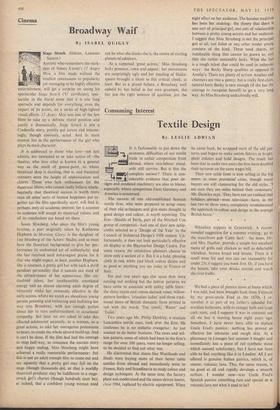Cinema
Broadway Waif
By ISABEL QUIGLY Stage Struck. (Odeon, Leicester Square.) ANYONE who remembers the stark- Iness of Sidney Lumet's 12 Angry Men, a film made without the smallest concessions to popularity yet managing to be highly effective entertainment, will get a surprise on seeing his spectacular Stage Struck ('U' certificate), spec- tacular in the literal sense that it is one long spectacle and depends for everything, even the impact of its actors, on a series of high-lighted visual effects. 12 Angry Men was one of the few films to take up a definite moral position and justify it dramatically. Stage Struck is, just a Cinderella story, prettily put across and interest- ingly, though unevenly, acted. And its main interest lies in the performance of the girl who plays its main character.
.It is addressed to those who love—not just admire, are interested in or take notice of—the theatre; who love what is known in a general way as the smell of grease-paint, to whom theatrical shop is dazzling, that is, and theatrical manners seem the height of sophistication and charm. Those who lack enthusiasm for the theatrical idiom, who cannot really believe whole- heartedly that theatrical success is worth more than all other'sorts of human happiness put to- gether (as the film specifically says), will find it, perhaps, only of academic interest; for it assumes its audience will accept its theatrical values, and all its conclusions are based on them.
Susan Strasberg, who plays the film's young heroine, a part originally taken by Katharine Hepburn in MorningGlory, is the daughter of Lee Strasberg of the Actors' Studio, and so must have the theatrical background to give her per- formance its undoubted air of authenticity; and she has received such extravagant praise for it that one might expect, at least, another Hepburn. She is nineteen, a pretty girl but with such a shrill parakeet personality that it cancels out most of the attractiveness of her appearance. Her un- doubted talent, her inexhaustible emotional energy and an almost alarming adult degree of virtuosity make her extremely effective in the early scenes, where we watch an obnoZious young person preening and twittering and buffeting her way into Broadway, with just enough pathos about her to turn embarrassment to occasional sympathy. But later we are asked to take this affected adolescent seriously, as a woman, as a great actress, to take her outrageous pretensions to heart, to credit the whole absurd build-up. And it can't be done. If the film had had the courage to stop half-way, to renounce the success story and happy ending, Miss Strasberg might have achieved a really memorable performance : but . this is not an adult enough film to come out and say squarely that a pretty girl may fail on the stage (though thousands do), or that a worldly theatrical producer may be indifferent to a stage- struck girl's charms (though hundreds must be); or indeed, that a confident young woman need not be what she thinks she is, the centre of circling planets of admirers.
As a supposed 'great actress,' Miss Strasberg lacks presence, voice and appeal : her movements are surprisingly ugly and her mauling of Shake- speare brought a blush to this critical cheek, at least. But as a proud failure, a Broadway waif upheld by her belief in her own greatness, she has just the right mixture of qualities, just the right effect on her audience. The heroine tradition has been her undoing : the theory that there is one sort of principal girl, one sort of relationship between a pretty young actress and her audience. I suggest that Miss Strasberg is not the principal girl at all, not Juliet or any other tender young creature of the kind. These need charm, an indefinable thing that cannot be grown to, and that she rather noticeably lacks. What she has is a tough talent that could be used in unheroic ways : the Becky Sharp qualities as opposed to Amelia's. There are plenty of actress Amelias and charmers are two a penny; but a really first-class, natural-born Becky is rare enough (if she has the courage to recognise herself) to go a very long way. As Miss Strasberg undoubtedly will.


































 Previous page
Previous page